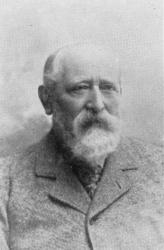- |
User Links
Clarence Bicknell › Hymnals

Clarence Bicknell in 1906 (from
"Albumo de Konataj Esperantistoj")
| Short Name: | Clarence Bicknell |
| Full Name: | Bicknell, Clarence, 1842-1918 |
| Birth Year: | 1842 |
| Death Year: | 1918 |
Clarence Bicknell (27 October 1842-17 July 1918) was a British amateur botanist, painter and archaeologist, with a doctorate in mathematics, and an Anglican priest (in Italy, from 1877 until he left the Church, date unknown). He was born in Herne Hill, England, on October 27, 1842, and died in Tenda (then in Italy, but since 1947 in France) on July 17, 1918.
Arriving in Italy in 1877 to work as an Anglican vicar, he built a museum ("Museo Biblioteca Clarence Bicknell") in Bordighera to house his botanical and archaeological collections. He became noted for his identification of the plants and petroglyphs of the Ligurian Riviera. His writings included Flowering Plants of the Riviera and Neighboring Mountains (1885) and Guide to the Prehistoric Rock Engravings of the Italian Maritime Alps (1913). In addition to his own museum, his collections were archived at the University of Genoa.
A Volapükist, he left that language for Esperanto in 1897. He attended the first international Esperanto convention, at Boulogne-sur-mer, France, in 1905. He produced a number of hymns that are still in use (seven translations and one original in Adoru Kantante (1971), and nine texts in Adoru (2001). He was active in work on behalf of the blind, and transcribed many Esperanto books into braille. In addition to his hymnic work, he wrote many original poems in, and translated secular poetry into, Esperanto, including Macaulay's "Horacio", 1906; Tennyson's "Gvinevero", 1907; pieces by Sturgis; Giacosa's "Ŝakludo", 1915. He also provided monetary support to many Esperanto activities, and founded and led until his death the local Esperanto club in Bordighera.
Regrettably, the date, reason, and nature of his "leaving the church" is not explained in the sources consulted (mainly the English, Italian, and Esperanto Wikipedias and the author indexes of the Esperanto hymnals).
See also http://www.clarencebicknell.com/index.php?option=com_content&view=article&id=16&Itemid=157&lang=en at clarencebicknell.com, the website of the Clarence Bicknell Association.
Leland Bryant Ross


 My Starred Hymns
My Starred Hymns


